NLIS 3
April 15, 2005
(Government Services)
The following is being distributed
at the request of the Petroleum Pricing Office:
Petroleum Pricing
Office releases maximum prices for regulated fuels
Effective 12:01 a.m. Friday, April
15, the maximum price for all types of gasoline (last adjusted March
22) will increase by 2.1 cents per litre (cpl); diesel by 2.0 cpl;
stove oil by 1.61 cpl; and, residential propane used for home
heating purposes by 3.1 cpl.; whereas No. 2 blend furnace oil will
decrease by 0.27 cpl.
There will be no changes to maximum fuel prices in regions of the
province where a price freeze is in effect.
David Toms, director (acting) of the Public Utilities Board�s
Petroleum Pricing Office (PPO), said, "Despite an easing of world
oil prices on NYMEX (New York Mercantile Exchange) over the past few
days, this current price adjustment reflects the all-time high
pricing levels for commodities, such as gasoline, as well as other
fuels we regulate that have been sustained over the past month.
While consumers in this province have been able to avoid the
tremendous volatility and upward pressure on gasoline prices, in
particular, experienced in the U.S. and elsewhere in Canada over the
past few weeks, it is these pressures that are now being reflected
in these higher prices."
With a view to future pricing, Mr. Toms noted there are some
positive signs in the marketplace, but there are also other factors
that may serve to mitigate these favourable circumstances.
While lower world prices may be anticipated than has been exhibited
over the past month, there are several issues that could contribute
to continued volatility. Refinery output and current inventories are
expected to meet this summer�s demand for gasoline; however, mixed
reports from OPEC are emerging as to whether it is necessary to
increase production output levels. Distillate fuel inventories
(furnace/stove oil and diesel) are at the lower end of the average
range for this time of year, but much will depend on the impact of
weather conditions on this supply and hence on home heating oil
prices. There is also a strong demand for diesel, which is
continuing to place pressure on prices for this group of fuels.
Propane is experiencing an upward movement in prices due to
declining inventories resulting from colder-than-average weather and
increased use of this product in the petrochemical industry.
BACKGROUNDER
The PUB adjusts fuel prices on the 15th of each month using the
average daily prices for finished petroleum products as listed on
NYMEX (New York Mercantile Exchange). Outside of this scheduled
mid-month adjustment, the PPO responds to extreme volatility in
petroleum prices through the application of an "interruption
formula." This formula is applied if an average five-day maximum
differential is exceeded on NYMEX (e.g. 3.5 cpl. for gasoline, home
heating fuels or diesel; 5.0 cpl for propane) provided the change
doesn�t conflict with the mid-month adjustment. The formula is
implemented consistently, recognizing rapid decreases or increases
in market pricing, and is intended to fairly reflect commensurate
changes in the marketplace which affect both consumers and industry
alike.
Many of the factors that have influenced the fuel market throughout
the majority of this past 30-day period to push refined product
prices upward, include:
- crude oil prices (though not
directly used to calculate regulated fuel prices, but play a
role in their market-pricing movement) reached another record of
more than $58 US;
- up until last week, an emergency
reserve, known as the U.S. Strategic Petroleum Reserves (SPR),
was being filled at a high rate during the period, which
contributed to a concern about a lack of available fuel supply
levels to serve normal markets;
- statements, such as Goldman
Sachs Group suggesting that oil could eventually reach as much
as $105 US, are not supported by current market fundamentals,
but had served to bolster prices unjustifiably;
- continuing concern of
insufficient fuel supply availability, despite increasing
inventories for oil and gasoline, to keep up with the projected
demand;
- economic growth in the U.S. and
China has led to increased fuel consumption, and global oil use
is also expected to climb; and,
- refinery production problems at
major facilities in Venezuela (the world�s fifth-biggest oil
exporter and a top supplier of crude and oil products to the
U.S.) and Texas (the third largest in the U.S.).
Illustrated in the following graphs
are the market-price performances of the five products regulated by
the PPO for recent regularly scheduled periods up to April 11, 2005
(except propane � April 8):
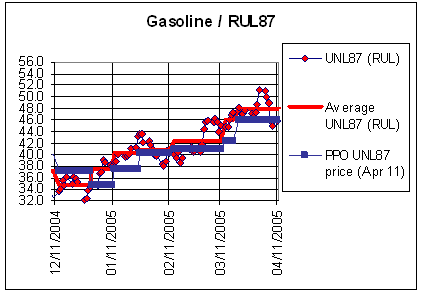
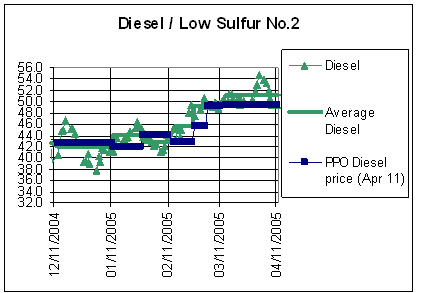
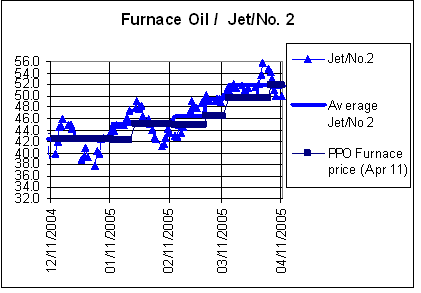
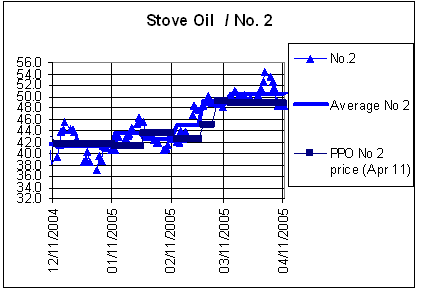
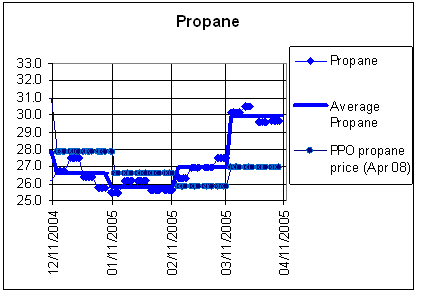
1.Heating Fuels - Residential
Propane - Maximum Tank Wagon Prices - April 15, 2005
2. Automotive Fuels - Maximum Retail Pump
Prices - Effective April 15, 2005
3. Heating Fuels - Maximum Tank Wagon
(or ** Tank Farm) Prices - Effective April 15, 2005
Media contact: Michelle Hicks, Communications. Tel: 1-866-489-8800
or (709) 489-8837.
2005 04 15
11:05 a.m.
|